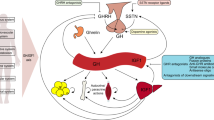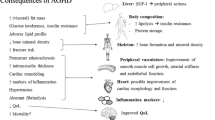Abstract
Purpose
Growth hormone (GH) therapy in adults alters thyroid function, and acromegaly often involves thyroid disease. The present study aimed to elucidate roles and mechanisms of GH in regulating thyroid function.
Methods
We performed two retrospective observational studies, which focused on consecutive patients with severe adult GH deficiency who received recombinant human GH (rhGH) therapy (n = 20) and consecutive patients with acromegaly who underwent transsphenoidal surgery (TSS) (n = 25). In both studies, serum free triiodothyronine (fT3), free thyroxine (fT4), and fT3/fT4 ratio were examined before and after the interventions. We subsequently administered GH to four human cell lines (HepG2, TSA201, MCF7, and HTC/C3) in vitro, and examined changes in mRNA levels of iodothyronine deiodinases (D1, D2, and D3).
Results
Median serum fT3 level significantly increased after rhGH therapy from 2.38 to 2.78 pg/mL (p < 0.001), and fT4 decreased from 1.115 to 1.065 ng/dL (p = 0.081). TSS significantly decreased median serum fT3 from 3.03 to 2.53 pg/mL (p < 0.001), and increased fT4 from 1.230 to 1.370 ng/dL (p < 0.001). In vitro, GH significantly increased D2 expression at the mRNA level in HTC/C3 cells (p < 0.01), as well as D2 protein and its activity.
Conclusions
GH increased serum fT3 level and decreased serum fT4 level in humans. Our results suggest that its mechanism involves D2 upregulation. Considering this GH effect on thyroid hormone metabolism, data on thyroid function could be useful in the management of GH deficiency and acromegaly.





Similar content being viewed by others
Explore related subjects
Discover the latest articles and news from researchers in related subjects, suggested using machine learning.References
A.J. Brooks, M.J. Waters, The growth hormone receptor: mechanism of activation and clinical implications. Nat. Rev. Endocrinol. 6(9), 515–525 (2010)
A.M. Dabrowska, J.S. Tarach, M. Kurowska, A. Nowakowski, Thyroid diseases in patients with acromegaly. Arch. Med. Sci. 10(4), 837–845 (2014)
S. Dagdelen, N. Cinar, T. Erbas, Increased thyroid cancer risk in acromegaly. Pituitary 17(4), 299–306 (2014)
P.H. Geelhoed-Duijvestijn, J.K. Bussemaker, F. Roelfsema, Changes in basal and stimulated TSH and other parameters of thyroid function in acromegaly after transsphenoidal surgery. Acta Endocrinol. 121(2), 207–215 (1989)
P.V. Carroll, E.R. Christ, B.A. Bengtsson, L. Carlsson, J.S. Christiansen, D. Clemmons, R. Hintz, K. Ho, Z. Laron, P. Sizonenko, P.H. Sonksen, T. Tanaka, M. Thorne, Growth hormone deficiency in adulthood and the effects of growth hormone replacement: a review. Growth Hormone Research Society Scientific Committee. J. Clin. Endocrinol. Metab. 83(2), 382–395 (1998)
J.O. Jorgensen, S.A. Pedersen, P. Laurberg, J. Weeke, N.E. Skakkebaek, J.S. Christiansen, Effects of growth hormone therapy on thyroid function of growth hormone-deficient adults with and without concomitant thyroxine-substituted central hypothyroidism. J. Clin. Endocrinol. Metab. 69(6), 1127–1132 (1989)
J.O. Jorgensen, J. Moller, T. Laursen, H. Orskov, J.S. Christiansen, J. Weeke, Growth hormone administration stimulates energy expenditure and extrathyroidal conversion of thyroxine to triiodothyronine in a dose-dependent manner and suppresses circadian thyrotrophin levels: studies in GH-deficient adults. Clin. Endocrinol. 41(5), 609–614 (1994)
S. Porretti, C. Giavoli, C. Ronchi, G. Lombardi, M. Zaccaria, D. Valle, M. Arosio, P. Beck-Peccoz, Recombinant human GH replacement therapy and thyroid function in a large group of adult GH-deficient patients: when does L-T(4) therapy become mandatory? J. Clin. Endocrinol. Metab. 87(5), 2042–2045 (2002)
N. Glynn, H. Kenny, L. Quisenberry, D.J. Halsall, P. Cook, T. Kyaw Tun, The effect of growth hormone replacement on the thyroid axis in patients with hypopituitarism: in vivo and ex vivo studies. Clin. Endocrinol. 86(5), 747–754 (2017)
A. Agha, D. Walker, L. Perry, W.M. Drake, S.L. Chew, P.J. Jenkins, A.B. Grossman, J.P. Monson, Unmasking of central hypothyroidism following growth hormone replacement in adult hypopituitary patients. Clin. Endocrinol. 66(1), 72–77 (2007)
M. Losa, M. Scavini, E. Gatti, A. Rossini, S. Madaschi, I. Formenti, A. Caumo, C.A. Stidley, R. Lanzi, Long-term effects of growth hormone replacement therapy on thyroid function in adults with growth hormone deficiency. Thyroid 18(12), 1249–1254 (2008)
G. Amato, G. Izzo, I. Salzano, A. Bellastella, Recombinant human growth hormone treatment at low doses does not significantly change thyroid function in growth hormone deficient adults. J. Endocrinol. Invest. 19(8), 563–566 (1996)
B. Rapoport, G.D. Chazenbalk, J.C. Jaume, S.M. McLachlan, The thyrotropin (TSH) receptor: interaction with TSH and autoantibodies. Endocr. Rev. 19(6), 673–716 (1998)
D.L. MacLatchy, H. Kawauchi, J.G. Eales, Stimulation of hepatic thyroxine 5’-deiodinase activity in rainbow trout (Oncorhynchus mykiss) by Pacific salmon growth hormone. Comp. Biochem. Physiol. Comp. Physiol. 101(4), 689–691 (1992)
V.M. Darras, P. Rudas, T.J. Visser, T.R. Hall, L.M. Huybrechts, A. Vanderpooten, L.R. Berghman, E. Decuypere, E.R. Kuhn, Endogenous growth hormone controls high plasma levels of 3,3’,5-triiodothyronine (T3) in growing chickens by decreasing the T3-degrading type III deiodinase activity. Domest. Anim. Endocrinol. 10(1), 55–65 (1993)
D. Salvatore, H. Tu, J.W. Harney, P.R. Larsen, Type 2 iodothyronine deiodinase is highly expressed in human thyroid. J. Clin. Invest. 98(4), 962–968 (1996)
B. Gereben, D. Salvatore, J.W. Harney, H.M. Tu, P.R. Larsen, The human, but not rat, dio2 gene is stimulated by thyroid transcription factor-1 (TTF-1). Mol. Endocrinol. 15(1), 112–124 (2001)
K. Chihara, A. Shimatsu, N. Hizuka, T. Tanaka, Y. Seino, Y. Katofor, A simple diagnostic test using GH-releasing peptide-2 in adult GH deficiency. Eur. J. Endocrinol. 157(1), 19–27 (2007)
K. Kageyama, T. Nigawara, S. Sakihara, S. Takayasu, K. Terui, T. Moriyama, T. Suda, Diagnostic usefulness of the growth hormone-releasing peptide-2 test as a substitute for the insulin tolerance test in hypopituitarism. Endocr. J. 55(4), 777–783 (2008)
L. Katznelson, E.R. Laws Jr., S. Melmed, M.E. Molitch, M.H. Murad, A. Utz, J.A. Wass, Acromegaly: an endocrine society clinical practice guideline. J. Clin. Endocrinol. Metab. 99(11), 3933–3951 (2014)
T. Isojima, A. Shimatsu, S. Yokoya, K. Chihara, T. Tanaka, N. Hizuka, A. Teramoto, K.I. Tatsumi, K. Tachibana, N. Katsumata, R. Horikawa, Standardized centile curves and reference intervals of serum insulin-like growth factor-I (IGF-I) levels in a normal Japanese population using the LMS method. Endocr. J. 59(9), 771–780 (2012)
T. Enomoto, H. Sugawa, D. Inoue, M. Miyamoto, S. Kosugi, T. Takahashi, N. Kitamura, I. Yamamoto, J. Konishi, T. Mori et al.. Establishment of a human undifferentiated thyroid cancer cell line producing several growth factors and cytokines. Cancer 65(9), 1971–1979 (1990)
Y. Kanou, A. Hishinuma, K. Tsunekawa, K. Seki, Y. Mizuno, H. Fujisawa, T. Imai, Y. Miura, T. Nagasaka, C. Yamada, T. Ieiri, M. Murakami, Y. Murata, Thyroglobulin gene mutations producing defective intracellular transport of thyroglobulin are associated with increased thyroidal type 2 iodothyronine deiodinase activity. J. Clin. Endocrinol. Metab. 92(4), 1451–1457 (2007)
T.L. Fonseca, M. Correa-Medina, M.P. Campos, G. Wittmann, J.P. Werneck-de-Castro, R. Arrojo e Drigo, M. Mora-Garzon, C.B. Ueta, A. Caicedo, C. Fekete, B. Gereben, R.M. Lechan, A.C. Bianco, Coordination of hypothalamic and pituitary T3 production regulates TSH expression. J. Clin. Invest. 123(4), 1492–1500 (2013)
P. Burman, A.G. Johansson, A. Siegbahn, B. Vessby, F.A. Karlsson, Growth hormone (GH)-deficient men are more responsive to GH replacement therapy than women. J. Clin. Endocrinol. Metab. 82(2), 550–555 (1997)
W.M. Drake, D. Coyte, C. Camacho-Hubner, N.M. Jivanji, G. Kaltsas, D.F. Wood, P.J. Trainer, A.B. Grossman, G.M. Besser, J.P. Monson, Optimizing growth hormone replacement therapy by dose titration in hypopituitary adults. J. Clin. Endocrinol. Metab. 83(11), 3913–3919 (1998)
J.P. Span, G.F. Pieters, C.G. Sweep, A.R. Hermus, A.G. Smals, Gender difference in insulin-like growth factor I response to growth hormone (GH) treatment in GH-deficient adults: role of sex hormone replacement. J. Clin. Endocrinol. Metab. 85(3), 1121–1125 (2000)
A.C. Bianco, G. Anderson, D. Forrest, V.A. Galton, B. Gereben, B.W. Kim, P.A. Kopp, X.H. Liao, M.J. Obregon, R.P. Peeters, S. Refetoff, D.S. Sharlin, W.S. Simonides, R.E. Weiss, G.R. Williams, American Thyroid Association Guide to investigating thyroid hormone economy and action in rodent and cell models. Thyroid 24(1), 88–168 (2014)
D.J. Chia, P. Rotwein, Defining the epigenetic actions of growth hormone: acute chromatin changes accompany GH-activated gene transcription. Mol. Endocrinol. 24(10), 2038–2049 (2010)
A.L. Maia, B.W. Kim, S.A. Huang, J.W. Harney, P.R. Larsen, Type 2 iodothyronine deiodinase is the major source of plasma T3 in euthyroid humans. J. Clin. Invest. 115(9), 2524–2533 (2005)
H.J. Schneider, M. Buchfelder, H. Wallaschofski, A. Luger, G. Johannsson, P.H. Kann, A. Mattsson, Proposal of a clinical response score and predictors of clinical response to 2 years of GH replacement therapy in adult GH deficiency. Eur. J. Endocrinol. 173(6), 843–851 (2015)
U. Feldt-Rasmussen, G. Brabant, D. Maiter, B. Jonsson, A. Toogood, M. Koltowska-Haggstrom, A.K. Rasmussen, M. Buchfelder, B. Saller, B.M. Biller, Response to GH treatment in adult GH deficiency is predicted by gender, age, and IGF1 SDS but not by stimulated GH-peak. Eur. J. Endocrinol. 168(5), 733–743 (2013)
E.J. Barbosa, J. Koranyi, H. Filipsson, B.A. Bengtsson, C.L. Boguszewski, G. Johannsson, Models to predict changes in serum IGF1 and body composition in response to GH replacement therapy in GH-deficient adults. Eur. J. Endocrinol. 162(5), 869–878 (2010)
J. Svensson, N. Finer, P. Bouloux, J. Bevan, B. Jonsson, A.F. Mattsson, M. Lundberg, P.E. Harris, M. Koltowska-Haggstrom, J.P. Monson, Growth hormone (GH) replacement therapy in GH deficient adults: predictors of one-year metabolic and clinical response. Growth Horm. IGF Res. 17(1), 67–76 (2007)
E. Cacciari, P. Tassoni, A. Cicognani, P. Pirazzoli, S. Salardi, A. Balsamo, A. Cassio, S. Zucchini, C. Colli, D. Tassinari et al.. Value and limits of pharmacological and physiological tests to diagnose growth hormone (GH) deficiency and predict therapy response: first and second retesting during replacement therapy of patients defined as GH deficient. J. Clin. Endocrinol. Metab. 79(6), 1663–1669 (1994)
K. Iwaku, J.Y. Noh, A. Minagawa, Y. Kosuga, M. Suzuki, K. Sekiya, M. Matsumoto, H. Ohye, Y. Kunii, A. Yoshihara, N. Watanabe, K. Mukasa, K. Ito, K. Ito, Determination of pediatric reference levels of FT3, FT4 and TSH measured with ECLusys kits. Endocr. J. 60(6), 799–804 (2013)
Acknowledgements
This work was supported by JSPS KAKENHI Grant Number 16H06902. We thank Dr. Hideo Sugawa for donating the HTC/C3 cells and providing technical advice.
Author information
Authors and Affiliations
Corresponding author
Ethics declarations
Conflict of interest
The authors declare that they have no conflict of interest.
Ethical approval
The studies were approved by the Institutional Review Board and Ethics Committee of the Kyoto University Graduate School of Medicine, and were conducted in accordance with the principles of the Declaration of Helsinki.
Electronic supplementary material
Rights and permissions
About this article
Cite this article
Yamauchi, I., Sakane, Y., Yamashita, T. et al. Effects of growth hormone on thyroid function are mediated by type 2 iodothyronine deiodinase in humans. Endocrine 59, 353–363 (2018). https://doi.org/10.1007/s12020-017-1495-y
Received:
Accepted:
Published:
Issue Date:
DOI: https://doi.org/10.1007/s12020-017-1495-y




